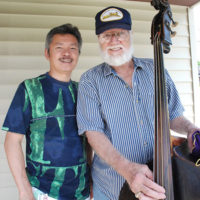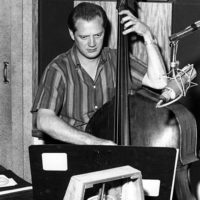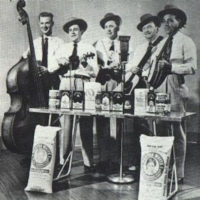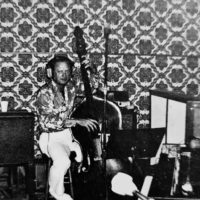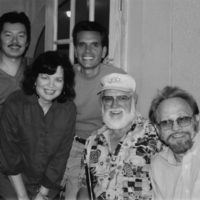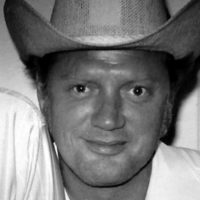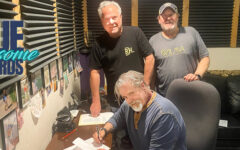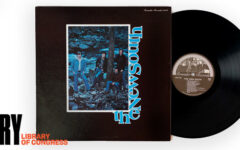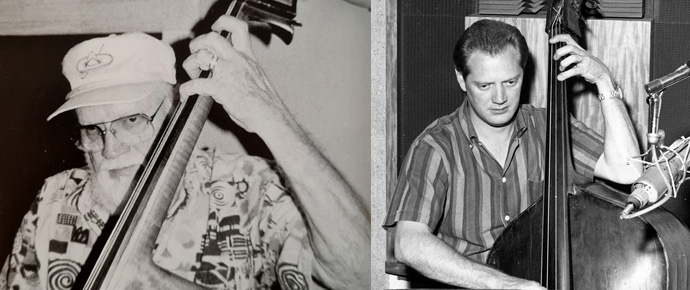
Bob Loyce Moore, who passed away on September 22, 2021, was a charter member of Nashville’s original studio A-Team, with over 17,000 documented recording sessions. He played upright bass for top country music acts such as Patsy Cline, Sammi Smith, Kenny Rogers, Roger Miller, Marty Robbins, George Jones, Conway Twitty, Tammy Wynette, Loretta Lynn, and Jeannie C. Riley. Some of the recordings on which he is featured were #1 country singles
He also worked in the studio with a diverse set of artists, including Elvis Presley, Roy Orbison, Brook Benton, Simon & Garfunkel, Brenda Lee, Bobby Darin, Connie Francis, and Bob Dylan.
Having gotten his start with the Grand Ole Opry comedy team Jamup and Honey, Moore went onto become a very talented musician and arranger leading his own orchestra for 20 years. He lifted bass playing out of the shadows and brought it to a greater prominence in Nashville. No longer was the role to be simply associated with slapstick and disguise.
In common with so many of the very best he had a way of pulling a string that got a better tone and volume from a bass. Moore owes this to a strong right hand, gained from working on it from an early age.
With those musical skills he also embraced the challenges of bluegrass music. Beginning in 1952 he worked with Lester Flatt and Earl Scruggs; from Monday to Friday, he awoke at 4.00 a.m. to accompany them on their live, 15-minute WSM show.
While part of the Foggy Mountain Boys Moore did two sessions (in August 1953) both at the famous Castle Studio at The Tulane Hotel in Nashville. During the first Moore played bass on four songs, and during the following afternoon he helped on four more cuts. All but two cuts were released on singles.
I’ll Go Stepping Too (Columbia 21179) was recorded on August 29, 1953
About two years later, on a Saturday afternoon in September, Moore again assisted Flatt and Scruggs as they recorded four Gospel songs, one of which was Bubbling In My Soul ….
All the tracks are on the 2-CD set Flatt & Scruggs Foggy Mountain Gospel (Columbia C2K 92574, 2005).
Also, the Flatt & Scruggs recordings from the first decade (or so) are on a Bear Family box-set Flatt & Scruggs – 1948-1959 (BCD 15472 DH (4CDs), 1991)
Towards the end their partnership Flatt and Scruggs called upon Bob Moore to work with them on a few occasions. In September 1966 he worked on one number Why Can’t I Find Myself With You, while in May the following year they recorded five songs three of which remained unissued.
One single California Up Tight Band/Last Train To Clarksville (Columbia 4-44194) first appeared on the Billboard chart during July 1967, peaking at #20.
[Material like this didn’t really suit Lester Flatt and was a part of the reason he eventually parted ways with Earl Scruggs.]
Then, during 1968 and 1969 Moore took part in six sessions at the Columbia Recording Studio A, in the Music Row area, with Flatt & Scruggs, recordings that are included on the LPs Nashville Airplane (Columbia CS 9741) and Final Fling-One Last Time (Just For Kicks) (Columbia CS 9945).
Recordings from the last five years are documented on Flatt & Scruggs – 1964-1969, plus (Bear Family Records BCD 15879 FI (6 CDs), 1995).
From June 1952 to March 1953 Moore played on 16 of Jim & Jesse McReynolds’s 20 sides for Capitol Records. Seven singles were released the first being in September 1952 and the last during June 1955.
I’ll Wash Your Love from My Heart was the first song recorded at the June 1952 session ….
Two songs Waiting For A Message and Two Arms To Hold Me were not issued until the release in 1969 of Twenty Great Songs by Jim & Jesse The McReynolds Bros (Capitol Records DTBB-264).
All of the Capitol recordings were reissued on Jim & Jesse, 1952-1955 (Bear Family BCD-15635) in 1992, while Jim & Jesse – First Sounds: The Capitol Years (Capitol Nashville 72435-42065-2-8, 2002) is devoted to those 16 cuts on which Moore played.
In February 1969 Moore was again in the studio with the brothers as they did five tracks for the Jim And Jesse – Saluting The Louvin Brothers LP (Epic BN-26465, May 1969), their penultimate album for the label. These consisted of Must You Throw Dirt In My Face, When I Stop Dreaming, Knoxville Girl, I Take The Chance and I’m Hoping That You’re Hoping, all of which are included on the 5-CD box-set from 1994; Bluegrass And More (Bear Family Records BCD 15716 EI).
Another well-known act with whom Moore recorded was the Osborne Brothers, initially helping them out in September and October 1971. During the first session they did three numbers for their Country Roads LP (Decca DL 75321, 1971), and during the following month they cut three more songs all of which were released on the album Bobby & Sonny (Decca DL 75356, 1972). For all of them Moore used an electric bass.
The brothers recorded Merle Haggard’s Shelly’s Winter Love on September 28, 1971….
Not surprisingly, Richard Weize re-issued these in another box set (4-CDs); The Osborne Brothers, 1968-1974 (Bear Family Records BCD 15748 DI, 1995).
They were reunited in the studio early in 1978 when they gathered at the Hilltop Recording Studios in Madison where they laid down tracks for The Osborne Brothers’ Bluegrass Collection (CMH 9011, 1978) (2 LPs). These 24 “contemporary recordings of outstanding and memorable bluegrass compositions” gave Moore a real test of his bluegrass chops. In 1989 the label re-released all of this material on a CD (also CMH 9011).
For a while – during the years 1975 onto 1980 – The Lewis Family, the bluegrass Gospel musicians from Lincolnton, Georgia, had some recording sessions in the Nashville area with Bob Moore on bass. All were for the Southern Gospel label Canaan Records, based in Waco, Texas.
Together they recorded four LPs in the name of the Lewis Family – Absolutely Lewis! (Canaan CAS-9764, released August 1975); Lewis Family Style Gospel (CAS-9782, May 1976); Country Faith (CAS-9820, 1977); and Wrapped With Grace And Tied With Love (CAS-9836, ca. November 1978) – and two – Little Roy Lewis – Entertainer (Canaan CAS-9811, 1977) and Super Pickin’ (CAS-9870, 1980) showcasing Little Roy Lewis’s individual talents.
You Can’t Be A Beacon is the opening track to the Absolutely Lewis! LP …
Bob Moore also recorded with Japanese bluegrass and country singer and multi-instrumentalist/promoter Kazuhiro Inaba. On the first occasion, at The Fiddle House, Nashville, on May 23, 2002, they did 10 tracks; most of the material, including five songs penned by Hank Williams, was predominantly from the country music catalogue.
These are on the album Teardrop On A Rose (Copper Creek Records CCCD-0216, 2003).
Inaba shares these thoughts on working with Moore ….
“Everyone has a dream. Every musician has a dream to record with his or her heroes. I had a dream to record with one of the best bassists, Bob Moore, ever since I listened to a lot of recordings of him especially with the Statler Brothers during 1970s and the Osborne Brothers’ Bluegrass Collection.
It happened when I recorded my Teardrop On A Rose album (previously Copper Creek Records and now Southern Breeze Records) in 2002. I asked Buddy Spicher to get him for me. I had a reckless plan to record 10 vocal songs in one day in Nashville while I conducted my small tour group from Japan. It was a crazy plan for me to see now, but it did happen, and we, Buddy Spicher, Bob Moore, Keith Little, and Kathy Chiavola, got it done! It took us 10 or 12 hours in the studio without dinner break. Everyone was so co-operative and they understood the situation, and I didn’t hear any complaints. Bob Moore’s playing and his notes are so incredible, and Keith Little expressed ‘his playing was like a freight train!’
In 2009, I had another opportunity to record a country album called Country Heart (Southern Breeze Records), and I was so lucky and fortunate to record with those Nashville A-team session players like Lloyd Green, Pete Wade, Hargus ‘Pig’ Robbins, Charlie McCoy, and again with Buddy Spicher and Bob Moore. My friend and mentor, Buddy Spicher, called them up for me at Burns Station Studio, and they hugged each other and talked about the good old days. It was truly their ‘reunion.’ We spent two days for recordings – four 3-hour sessions.
Right before the first recording session started, a noted bassist, Dennis Crouch, brought his old RCA microphone for Bob. I realized how much Dennis admired Bob.
Bob was always reliable on what he did, and cheerful at the studio.
About 10 years ago or so, I talked with Sonny Osborne. All of a sudden, Sonny told me that he really enjoyed listening to Bob’s playing on the Osborne Brothers’ Bluegrass Collection with such an excitement. I told Sonny that we knew it and enjoyed it since some decades ago. It seemed Sonny didn’t have time to listen to the bass carefully before his retirement. Sonny did love Bob’s playing and he was blown away by what Bob played.”
As intimated, the subsequent sessions were more country music inclined. Country Heart (Southern Breeze Records SBR-9001, 2009) features some standard 1950s country songs/tunes, an old folk song, and a couple of western swing classics.
Moore, as part of the A-Team, was inducted into the Musicians Hall of Fame in 2007.
R.I.P. Bob Moore
(November 30, 1932 – September 22, 2021)
Bluegrass Today gratefully acknowledges the assistance of Kent Blanton, Gary B Reid, and Kazuhiro Inaba.

